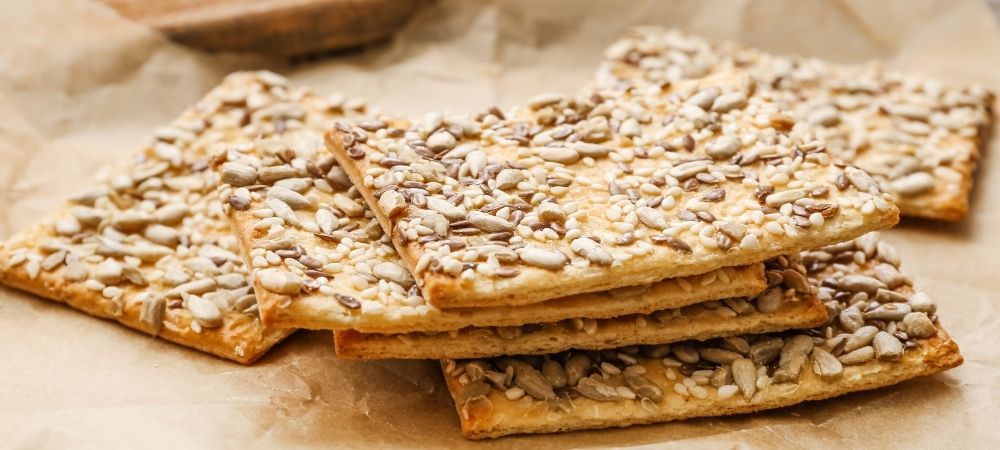
With all the choices available, it’s easy to get confused and worried about whether you should share crackers with your pet.
Don’t crack under pressure! Some crackers are safe for your dog, while others you should avoid. It all boils down to their ingredients.
Let’s dive into a vast world of crackers and find out which you can share with your pooch.
Can Dogs Eat Crackers?
Yes, you can give your dog some crackers, but only if the ingredients are safe. The exceptions are puppies and young dogs — don’t give them any crackers since they are extremely sensitive to human food.
Some crackers are very high in carbs and salt. Over time, these can lead to obesity, heart disease, diabetes, and other lifelong diseases in dogs. They can also cause salt toxicity, which is one of the biggest concerns for a dog’s health.
That being said, different crackers have different ingredients and will be more or less dangerous for the health of your four-legged friend.
Can Dogs Eat Saltine Crackers?
Your best bet is not to give Saltine crackers to your dog at all.
If your dog ate one of these, there shouldn’t be any bigger complications. However, as their name suggests, saltine crackers are high in salt. Ingesting too much salt can lead to many health issues.
Symptoms of salt toxicity include vomiting, diarrhea, dehydration and can even lead to organ failure, coma, and death. Make sure your dog has access to fresh water all the time.
Popular Crackers And Dogs
There are many brands of crackers out there, but a few of them are pretty popular. Let’s look at these and whether you can share them with your dog.
Can Dogs Eat Belvita Crackers?
Belvita crackers are high in fiber, sugar, and carbs. All of these ingredients can lead to digestive and other health issues.
If your dog snacks on one of these crackers, they will probably be okay. However, If they eat too many, they could end up with an upset stomach, constipation, diarrhea, or even vomiting.
Can Dogs Eat Chicken-In-A-Biscuit Crackers?
One Chicken In A Biscuit cracker is unlikely to harm your dog. But, because they are very high in salt, you’ll have to adjust your dog’s daily salt intake.
Sodium toxicity is a severe condition that can even lead to a dog’s organ failure and death in extreme cases. Make sure your dog gets enough water and watch out for the signs of salt toxicity.
If your dog is allergic to poultry, it’s best to avoid these crackers, since they might trigger an allergic reaction.
Can Dogs Eat Club Crackers?
Club crackers may be fun, but they are high in sodium. It is best to avoid them.
You can feed your dog with club crackers in minimal quantities. But it is crucial to monitor your dog and pay attention to any symptoms of salt toxicity.
Can Dogs Eat Goldfish Crackers?
Goldfish crackers won’t hurt your dog if they are occasional dog food. They are still high in carbs and salt. If your dog snacks on them regularly, they can lead to obesity, diabetes, salt toxicity, and other severe conditions.
Avoid them if you can, just like the different version — whale crackers. Both of these are very high in calories.
Can Dogs Eat Graham Crackers?
Dogs can eat Graham crackers but only in small amounts and occasionally. They are not high in sodium like saltine crackers, but they are very high in sugar.
Sugar isn’t toxic to dogs. Still, it can lead to obesity, diabetes, and other related diseases.
Can Dogs Eat Ritz Crackers?
Ritz crackers are safe in small amounts but should not be used as treats, and you should not give them to your dog regularly.
These crackers are very popular, both in supermarkets and at social gatherings. They come in various flavors, some of which you can see below.
Can Dogs Eat Toast Chee Crackers?
This variety is very high in sodium, so don’t let your dog eat it. They also contain peanut butter, which can be extremely dangerous if your dog has a peanut allergy.
If your dog ate a few of these crackers, they should be okay. Remember to give them plenty of water and withhold any other foods with a lot of salt.
Can Dogs Eat Triscuits?
The fiber content in Triscuits is very high. It can cause loads of digestive issues, like upset stomach, constipation or diarrhea, and vomiting. Triscuits are also very high in calories, so dogs on weight management should not eat them.
Since they’re made with whole wheat, gluten intolerant dogs should avoid them as well. Don’t give Triscuits to your dog as a regular treat, and it would be best to avoid them.
Can Dogs Eat Wheat Thins?
Don’t feed your dog wheat thins regularly because they are high in carbs and salt. They also contain gluten, so it’s best to avoid them if your dog has gluten intolerance or allergy.
Wheat Thins also come in many different flavors. Make sure you don’t feed your dog crackers with garlic or onion because they are highly toxic to dogs.
Both of these can cause immense problems with hemoglobin and lead to oxygen deficiency (hypoxia).

Can Dogs Eat Plain Crackers?
Dogs can safely eat plain crackers in small amounts and on rare occasions. Since the plain crackers don’t contain additional salt, sugar, and other flavors, they are the safest version for your pets.
However, since they do not provide health benefits to a dog, don’t make them a regular part of a dog’s diet.
Can Dogs Eat Almond Crackers?
Almond crackers are made with almond flour and are gluten-free. They are also safe for your dog if they don’t have onions, garlic, or too much salt.
However, don’t make almond crackers a regular treat for your pooch. Almonds are known to cause digestive issues in some dogs and can lead to an upset stomach.
Can Dogs Eat Baby Crackers?
Baby crackers are not high in salt, and they have safer ingredients. You can share baby crackers with your dog as an occasional treat and in small quantities.
Remember, it’s all about balance. If you share a baby cracker with your dog, make sure you’re not giving them other treats.
Can Dogs Eat Butter Crackers?
Butter crackers are safe for your dog as a rare treat and in very small quantities.
They are high in calories, fat, and salt, so you should still keep them away from your dog. If your dog eats too many butter crackers, they could easily cause loads of health issues and digestive problems. Over time, they lead to obesity in dogs.

Can Dogs Eat Peanut Butter Crackers?
You should not feed your dog peanut butter crackers because there are multiple risks involved.
Peanut butter crackers usually have a lot of sugar, salt, and fats. These ingredients can cause many health issues, ranging from digestive issues to obesity, diabetes, and salt toxicity.
Furthermore, some dogs may be allergic to peanuts. If you’re not sure whether your dog has a peanut allergy, it’s best to avoid these crackers altogether.
Can Dogs Eat Cheese Crackers?
Cheese crackers are best avoided because they can cause a lot of adverse health effects on a dog. Typically, these crackers include palm oil, milk, sugar, and salt. Sugar and salt alone can result in obesity, diabetes, and salt toxicity.
If your dog is also lactose intolerant, they might experience digestive issues such as vomiting, diarrhea, and an upset stomach.
Can Dogs Eat Cream Crackers?
Cream crackers are among the safer options for your dog but don’t overdo it. One cracker now and then is more than enough because they are still very high in calories.
Cream crackers taste like saltine crackers but are very low in sodium, making them a better alternative for your dogs.
Can Dogs Eat Cauliflower Crackers?
These crackers are safe for dogs in small amounts and occasionally, as long as they do not contain onion or garlic powder. Dogs happen to like raw cauliflower.
Cauliflower crackers are low-carb, but you still need to watch your dog’s salt intake.
Can Dogs Eat Matzo Crackers?
Matzo crackers are probably some of the cleanest packaged foods available. They are made from matzah flour containing one of the five grains: rye, barley, wheat, oats, or spelt.
If you’re going to give Matzo crackers to your dog, make sure there is no added salt. While matzah flour is quite pure, it does not have an exceptional nutritional profile. It provides mainly empty calories.
You should not give too many Matzo crackers to your dog and don’t do it often because of weight management.
Can Dogs Eat Oyster Crackers?
Oyster crackers are low in sodium, and there are no harmful spices for your dog. Plus, because of their look and size, they’re fun to share with your furry companion.
In other words, yes, dogs can safely eat a few oyster crackers.
Can Dogs Eat Prawn Crackers?
These crackers usually have fewer calories and lower fat content than many others. They are safe and aren’t toxic to dogs.
It’s good practice to check the ingredients anyway — make sure there is no added salt. Furthermore, you don’t want to give your dog too many of these because of the daily calorie limit.
Can Dogs Eat Pretzel Crackers?
Pretzels are notoriously bad for dogs because of their high salt content. Don’t give your dog pretzel crackers since you may be risking salt poisoning. This severe condition can cause many health issues.
Can Dogs Eat Puffed Rice Crackers?
Rice is typically beneficial for dogs in small amounts. If the dog eats too much rice, it could lead to digestive issues and an upset stomach.
Your dog can safely eat puffed rice crackers in small amounts. Just make sure they do not contain too much salt or toxic ingredients, like garlic or onion.
Can Dogs Eat Asian Rice Crackers?
Japanese rice crackers, Chinese rice crackers, sesame, and seaweed rice crackers — they’re all safe for your pooch in small amounts. As usual, make sure that these crackers do not contain too much salt or fats because these ingredients can harm your dog.
Can Dogs Eat Rye Crackers?
For dogs with gluten intolerance or allergy, rye crackers are a no-go. If you don’t know whether your dog is sensitive to gluten, it’s best to avoid them altogether.
Moreover, these crackers are typically very high in sodium, which is another reason why you should not be giving them to your dog.

Can Dogs Eat Crackers With Seeds?
Crackers with seeds are typically safe for your dog, but there are a few exceptions. Most seeds are not toxic for your dog.
Sesame crackers are non-toxic, but make sure to limit the amount your dog eats. Dogs can’t digest sesame seeds, so it’s hard for them to derive any nutritional benefits.
Also, you should be careful with high-calorie content in these crackers.
On the other hand, you should avoid poppyseeds crackers at all costs. Poppy seeds are toxic to dogs.
Either way, with other seeds, don’t allow your dog to eat too many of these crackers because they can still be very high in sodium and calories.
Can Dogs Eat Sourdough Crackers?
Sourdough crackers are safe for dogs in small quantities and on rare occasions.
These crackers are still high in calories, carbs, and fats. Allowing your pooch to snack on too many of these can lead to obesity and other severe health conditions. They could also cause digestive issues, e.g. swollen stomach.
Can Dogs Eat Wafer Crackers?
Thin wafer crackers are very low in calories and safe for your dog. Give your dog only small amounts of these crackers, and choose plain and low-salt options.
Can Dogs Eat Wheat Crackers?
You can choose between whole-grain or multigrain crackers. They are safe for your dog in small amounts if your pet doesn’t have gluten sensitivity.
However, they still have loads of carbs, fats, and sodium, so make sure to track your dog’s daily calories and salt intake.
Can Dogs Eat Flavoured Crackers?
With flavored crackers, the most important thing is to look at the ingredients. Even if you’re buying from the same brand, you still want to check them! Avoid too much salt in crackers and any crackers with onion, garlic, or xylitol.
You should also pay attention to the carbs and fat content because they can contribute to long-term health conditions in dogs.
Can Dogs Eat Honey Crackers?
No, you should not give your dog honey crackers. They’re very high in calories and sugar and could lead to obesity, diabetes, and many long-term health conditions.
Can Dogs Eat Lemon Crackers?
It is best if you could keep your dog away from lemon crackers. Ensure they do not have too much salt in them and no garlic, onion, or other toxic ingredients.
Can Dogs Eat Lemon Chickpea Crackers?
Lemon chickpea crackers are very high in salt, and they have chili seasoning. Dogs don’t react well to spicy foods and can experience burning sensations in the mouth and throat. Avoid feeding your dog these crackers.
Can Dogs Eat Crackers With Pepper?
Do not feed your dog crackers with pepper. Pepper is spicy food and can cause many health problems for your dog. Moreover, high sodium content can lead to salt poisoning and cause serious health problems.
Signs of Salt Toxicity?
The biggest concern with crackers is their high sodium content. If a dog eats too many crackers, it could lead to salt poisoning, a severe medical condition.
If you suspect your dog had too many crackers, watch out for the following symptoms of sodium toxicity:
- Vomiting
- Diarrhea
- Excessive thirst and urination
- Loss of appetite
- Lethargy
- Wobbly posture
- Tremors
- Seizures
- Coma
If you notice these symptoms, call the vet immediately or take the dog to a vet clinic. The vet will run tests and diagnose the severity of the condition and the necessary treatment.
Alternatives To Crackers
Crackers aren’t the treats they’re cracked up to be. While they may look fun to share with your furry best friend, they provide no nutritional value. There are many risks involved too.
It is much better to visit a pet store and look for special dog treats. These are loaded with health benefits for your dog and pose no health risks!
Keep your crackers for yourself, and give your dog the treat they deserve.
Can Dogs Eat Crackers: Cracked
So, can dogs eat crackers? It depends on the brand and ingredients.
Crackers can be safe for dogs in small amounts and on rare occasions, or toxic and cause serious health issues for your pooch. Either way, it’s best to check ingredients.
Avoid crackers that are high in salt, fats, and carbs. Also, make sure they don’t have any garlic, onions, poppy seeds, xylitol, or allergens like gluten or peanuts.
While it can be fun to share a cracker with your furry companion, no amount of fun is worth your dog’s health.
FAQ
Are crackers OK for dogs?
Crackers can be safe for dogs in small amounts and on rare occasions, but always check ingredients and make sure they are not high in salt, fat, and that there are no toxic ingredients or allergens.
Can dogs eat animal crackers?
Animal crackers are not toxic to dogs, but make sure they don’t have xylitol or chocolate. They are still dangerous as a regular treat, because of their high sugar and oil content.
Will saltine crackers hurt a dog?
Saltine crackers are very high in salt, sugar, and carbohydrates. Dogs should not eat them. Saltine crackers can cause obesity, diarrhea, and sodium toxicity in dogs.

